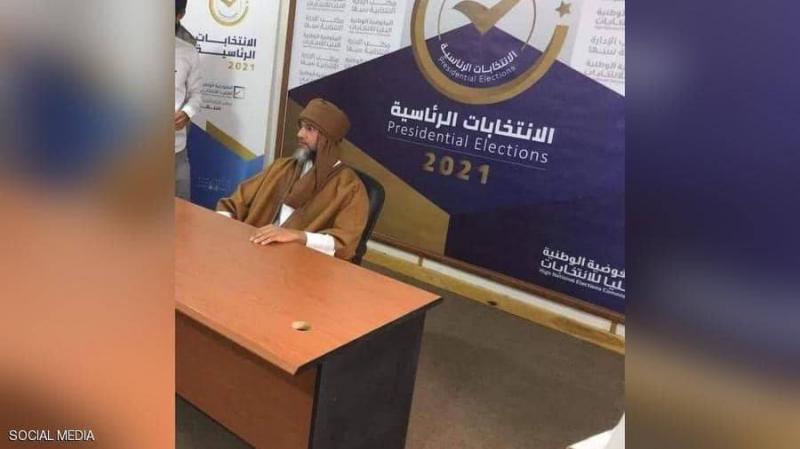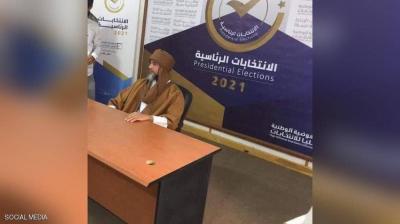Under the title "Video: Saif al-Islam Gaddafi Runs for Presidency in Libya," Sky News reported, accompanied by a video sourced from Libyan media, that Saif al-Islam, the son of the late leader Muammar Gaddafi, has submitted his candidacy papers to compete in the presidential elections scheduled for December 24. Saif al-Islam was seen wearing traditional Libyan attire while submitting his nomination papers at the High National Election Commission office in Sebha, in the southwestern region of the country. The communications and awareness management of the commission reported that Saif al-Islam arrived at the commission's branch on Sunday morning to submit the required paperwork.
Saif Gaddafi hinted at his intention to run during a recent appearance with an American media outlet, stating that the situation seemed suitable for a return after he had "remained in the shadows" for a long time.
He relies on two groups, as Libyan journalist Hussein Al-Maysouri told Sky News Arabia that Saif al-Islam depends on two factions: “The first are the supporters of the former Gaddafi regime, who support him because he is the son of the late leader, and his election would mean a return to Libya in 2010.” The second group, according to Al-Maysouri, consists of those disillusioned by the conditions experienced over the past decade, who may vote for him even though they are not inclined towards him, due to the fragmentation the country has faced, leading to the rise of interest groups and the Muslim Brotherhood in power, along with mismanagement of the country’s resources. However, he excluded the possibility of Saif al-Islam receiving support from outside these two factions, predicting that competitors would unite against him.
Libyan political analyst Osman Barakah agrees with this perspective, stating that Libyans will not elect Saif al-Islam because he is “a skilled politician able to solve problems, but rather they hope to return to the political stability they experienced just before the revolution,” and that they would prefer him over the Islamists who have dominated western regions for years. Barakah anticipated that Saif al-Islam could reach the final stages of the presidential elections, especially since Libya has experienced political chaos in recent years that has made citizens dissatisfied with the current political conditions and powers in the country.
### Prison Release
Saif al-Islam was arrested by militias controlling the city of Zintan in western Libya in 2011 and was tried on charges of killing opponents of his father during the events and protests of February, receiving a death sentence in 2015. In 2017, he was granted amnesty by parliament and was released from prison, subsequently disappearing from public view amidst reports that the city’s elders had requested he live freely without appearing in public life.
Despite Libya not signing the International Criminal Court charter, the court issued an arrest warrant for Saif al-Islam back in 2011 on accusations of committing war crimes, referencing the suppression of the February protests, and he remains a wanted man to this day.




